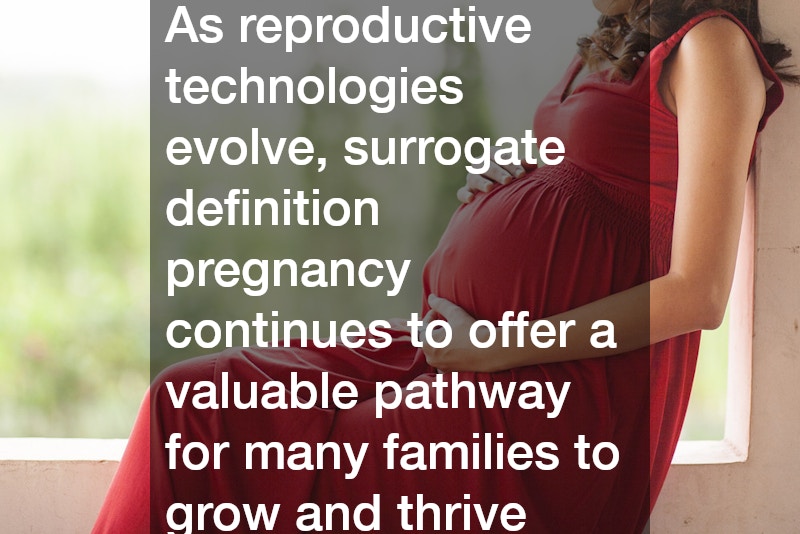In recent years, advances in reproductive technology and changing family dynamics have broadened the scope of how individuals and couples conceive and raise children. Surrogacy, in particular, has emerged as a viable option for those who face challenges in having children by traditional means. But what exactly does surrogate pregnancy entail, and how does it impact the families involved? This blog post aims to demystify the concept of surrogate definition pregnancy and provide insight into its nuances, legislative framework, and cultural perceptions.
Understanding the Basics of Surrogate Pregnancy
Surrogacy is a method of assisted reproduction where a woman agrees to carry and give birth to a child for another person or couple. Surrogate definition pregnancy typically involves two main arrangements: traditional surrogacy and gestational surrogacy.
In traditional surrogacy, the surrogate mother’s egg is used, making her the biological mother of the child. Conversely, gestational surrogacy involves the implantation of an embryo created using the egg and sperm of the intended parents or donors, meaning the surrogate has no genetic link to the child. Understanding these fundamental definitions is crucial for anyone considering surrogacy as an option.
Legislative Framework Surrounding Surrogacy
The legislative landscape for surrogacy varies widely across different regions, which can greatly affect the surrogate definition pregnancy process. Some countries have supportive legal frameworks allowing commercial surrogacy, while others only recognize altruistic surrogacy. In contrast, some countries have banned surrogacy altogether. It is essential for intended parents and surrogates to carefully research the legal aspects and ensure compliance with all local laws and regulations. Proper legal counsel can help navigate complexities such as parental rights and the enforceability of surrogacy agreements, ensuring a smoother process for both parties involved.
The Role of Surrogacy Agencies
Surrogacy agencies play a critical role in facilitating surrogate pregnancy by matching intended parents with suitable surrogates and guiding them through the entire process. These agencies ensure that both parties receive the necessary support and counseling throughout the journey. Moreover, they help manage the legal, medical, and financial aspects of surrogacy, establishing clear communication and agreement terms. Surrogacy agencies work to protect the interests of both the surrogate and the intended parents, making it significantly easier for individuals to pursue this path with confidence and security.
Emotional and Psychological Considerations
The surrogate definition pregnancy process extends beyond medical and legal challenges, involving emotional and psychological factors as well. Surrogacy can be an emotionally demanding journey for both the surrogate and the intended parents. Open communication, mutual respect, and setting realistic expectations are vital for creating a positive and supportive experience. Counseling provided by surrogacy agencies or independent professionals can help individuals navigate the emotional complexities, allowing them to prepare for the different stages of the journey. This support system is crucial in fostering a healthy relationship between all parties, ensuring that the surrogate pregnancy remains a positive experience.
Cultural Perceptions and Ethical Considerations
Cultural perceptions and ethical considerations play significant roles in shaping opinions about surrogate definition pregnancy. In some societies, surrogacy is seen as a testament to community, cooperation, and altruism, while in others, it may be viewed with skepticism and moral concern. Ethical debates often center around the commodification of reproduction, the rights of the child, and the exploitation of surrogates. As a result, individuals and policymakers must engage in open discussions to address these concerns, fostering a more inclusive understanding of the practice. By considering the cultural and ethical dimensions, surrogacy can become an accepted and respected part of the modern family-building landscape.
As reproductive technologies evolve, surrogate definition pregnancy continues to offer a valuable pathway for many families to grow and thrive. While it presents unique challenges and considerations, understanding the different aspects of surrogacy—from its legal implications and emotional dynamics to cultural perceptions and ethical concerns—can empower those who wish to pursue this journey responsibly and compassionately. By fostering supportive environments and informed discussions, society can embrace surrogacy as a means of creating families, helping people realize their dreams of parenthood. Moreover, promoting transparency, education, and access to ethical surrogacy options can bridge the gap between hopeful parents and the surrogates who generously support them. As awareness and acceptance grow, surrogacy has the potential to reshape traditional notions of family and redefine the ways in which people connect and support one another. Encouraging empathy, inclusivity, and respect for all individuals involved ensures that the process remains grounded in mutual trust and shared purpose. Ultimately, surrogacy reflects the profound human desire to nurture, love, and build meaningful bonds—no matter how families are formed.
.




